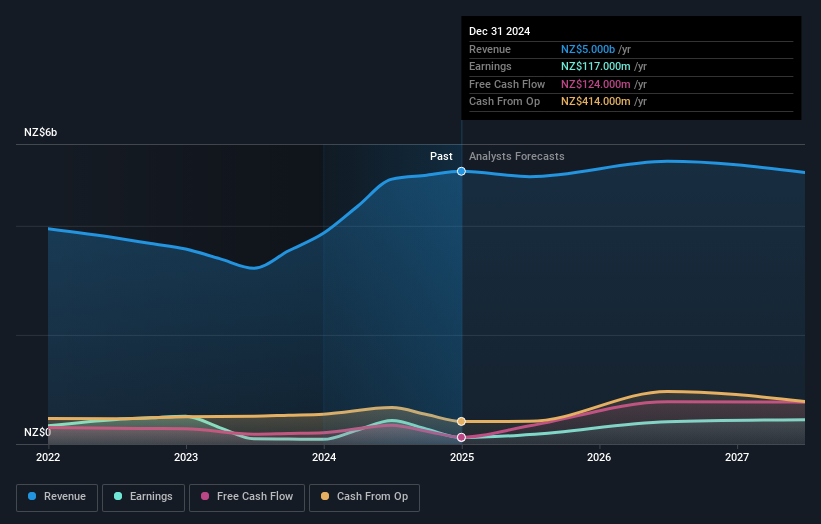- New Zealand
- /
- Renewable Energy
- /
- NZSE:MEL
While individual investors own 36% of Meridian Energy Limited (NZSE:MEL), state or government are its largest shareholders with 51% ownership
Key Insights
- Significant control over Meridian Energy by state or government implies that the general public has more power to influence management and governance-related decisions
- 51% of the company is held by a single shareholder (New Zealand)
- Insiders have been selling lately
If you want to know who really controls Meridian Energy Limited (NZSE:MEL), then you'll have to look at the makeup of its share registry. The group holding the most number of shares in the company, around 51% to be precise, is state or government. Put another way, the group faces the maximum upside potential (or downside risk).
Individual investors, on the other hand, account for 36% of the company's stockholders.
In the chart below, we zoom in on the different ownership groups of Meridian Energy.
Check out our latest analysis for Meridian Energy

What Does The Institutional Ownership Tell Us About Meridian Energy?
Institutions typically measure themselves against a benchmark when reporting to their own investors, so they often become more enthusiastic about a stock once it's included in a major index. We would expect most companies to have some institutions on the register, especially if they are growing.
Meridian Energy already has institutions on the share registry. Indeed, they own a respectable stake in the company. This implies the analysts working for those institutions have looked at the stock and they like it. But just like anyone else, they could be wrong. If multiple institutions change their view on a stock at the same time, you could see the share price drop fast. It's therefore worth looking at Meridian Energy's earnings history below. Of course, the future is what really matters.

Meridian Energy is not owned by hedge funds. Our data shows that New Zealand is the largest shareholder with 51% of shares outstanding. This essentially means that they have extensive influence, if not outright control, over the future of the corporation. With 1.9% and 1.8% of the shares outstanding respectively, The Vanguard Group, Inc. and BlackRock, Inc. are the second and third largest shareholders.
While it makes sense to study institutional ownership data for a company, it also makes sense to study analyst sentiments to know which way the wind is blowing. There are plenty of analysts covering the stock, so it might be worth seeing what they are forecasting, too.
Insider Ownership Of Meridian Energy
The definition of company insiders can be subjective and does vary between jurisdictions. Our data reflects individual insiders, capturing board members at the very least. Company management run the business, but the CEO will answer to the board, even if he or she is a member of it.
Insider ownership is positive when it signals leadership are thinking like the true owners of the company. However, high insider ownership can also give immense power to a small group within the company. This can be negative in some circumstances.
Our most recent data indicates that insiders own less than 1% of Meridian Energy Limited. It is a very large company, so it would be surprising to see insiders own a large proportion of the company. Though their holding amounts to less than 1%, we can see that board members collectively own NZ$9.4m worth of shares (at current prices). It is always good to see at least some insider ownership, but it might be worth checking if those insiders have been selling.
General Public Ownership
The general public-- including retail investors -- own 36% stake in the company, and hence can't easily be ignored. While this group can't necessarily call the shots, it can certainly have a real influence on how the company is run.
Next Steps:
It's always worth thinking about the different groups who own shares in a company. But to understand Meridian Energy better, we need to consider many other factors. Case in point: We've spotted 1 warning sign for Meridian Energy you should be aware of.
If you would prefer discover what analysts are predicting in terms of future growth, do not miss this free report on analyst forecasts .
NB: Figures in this article are calculated using data from the last twelve months, which refer to the 12-month period ending on the last date of the month the financial statement is dated. This may not be consistent with full year annual report figures.
New: Manage All Your Stock Portfolios in One Place
We've created the ultimate portfolio companion for stock investors, and it's free.
• Connect an unlimited number of Portfolios and see your total in one currency
• Be alerted to new Warning Signs or Risks via email or mobile
• Track the Fair Value of your stocks
Have feedback on this article? Concerned about the content? Get in touch with us directly. Alternatively, email editorial-team (at) simplywallst.com.
This article by Simply Wall St is general in nature. We provide commentary based on historical data and analyst forecasts only using an unbiased methodology and our articles are not intended to be financial advice. It does not constitute a recommendation to buy or sell any stock, and does not take account of your objectives, or your financial situation. We aim to bring you long-term focused analysis driven by fundamental data. Note that our analysis may not factor in the latest price-sensitive company announcements or qualitative material. Simply Wall St has no position in any stocks mentioned.
About NZSE:MEL
Meridian Energy
Engages in the generation and retailing of electricity to residential, business, and industrial customers in New Zealand, Australia, and the United Kingdom.
Moderate growth potential with mediocre balance sheet.
Similar Companies
Market Insights
Community Narratives




